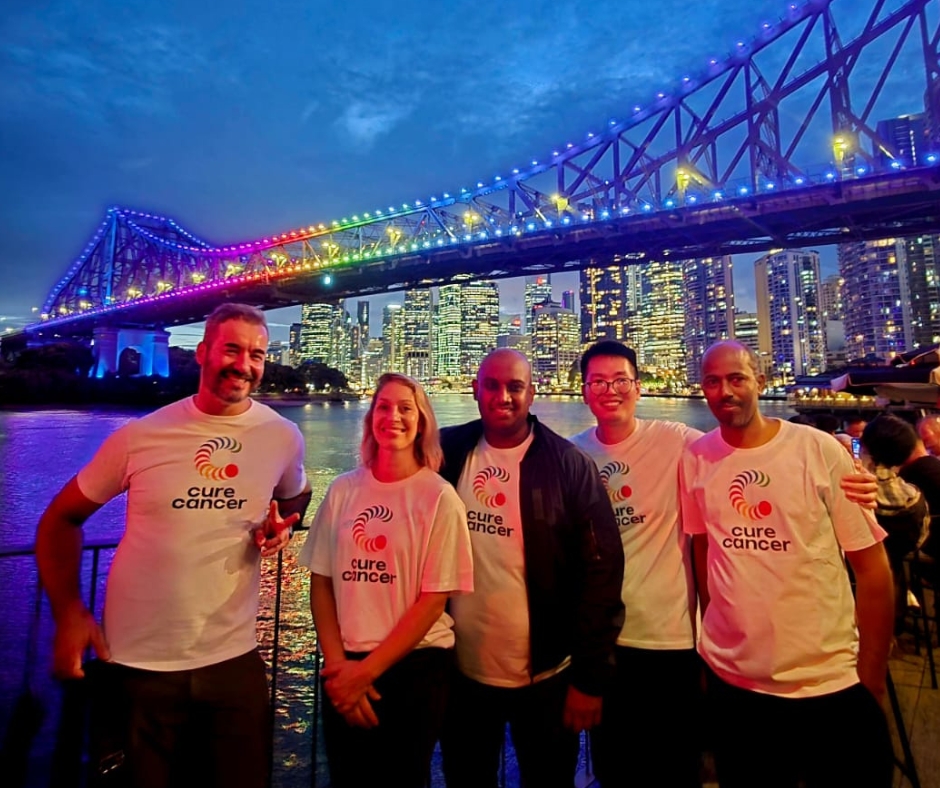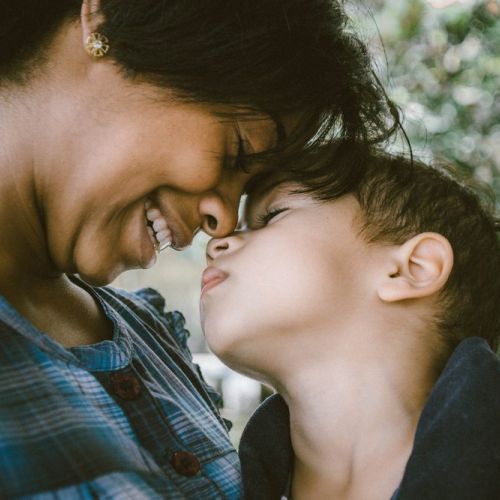Excellence in cancer research: Meet Cure Cancer's 2024 Researchers of the Year
By Emily Usher | 28 March 2024
David Hurley AC DSC (Retd) Governor-General of the Commonwealth of Australia and Mrs Linda Hurley at Admiralty House, where the 2024 Researcher of the Year Awards reception was held.

From left to right: Nikki Kinloch, CEO of Cure Cancer, Dr Yuchen Feng, Her Excellency Mrs Linda Hurley, His Excellency General the Honourable David Hurley AC DSC (Retd) Governor-General of the Commonwealth of Australia, and Paul Umbrazunas, Board Chair of Cure Cancer
- His Excellency Governor-General of Australia David Hurley
Thanks to the continued support of this wonderful community, Cure Cancer has been able to fund 85 groundbreaking research projects in the last 5 years. In line with our mission to back brave-thinking and kick-start new ideas in cancer research, we've invested $1.8m in funding for researchers this year alone – an increase of 50% since 2023. In 2024, we’re funding 14 brilliant scientists who are working across different cancers including blood cancer, bowel cancer, brain cancer, breast cancer, childhood cancer, liver cancer, lung cancer, and rare cancers. Additionally, in our ongoing dedication to fostering innovation, we've introduced 2-year grants for this round.
Over the years, the Researcher of the Year Awards has recognised 26 outstanding researchers who have made considerable advancements in their research areas.
- CEO Nikki Kinloch
This year, we celebrated the exceptional work of Cure Cancer alumni Dr Yuchen Feng, Dr Marjan Mojtabavi Naeni and Dr Asmerom Sengal in the fields of gastrointestinal and gynaecological cancers. Both Dr Marjan and Dr Asmerom were honoured as finalists, and the prestigious title of Researcher of the Year was awarded to Dr Yuchen Feng.
2024 Researcher of the Year
3rd Place: Dr Asmerom Sengal

Their Excellencies Governor-General of Australia David Hurley and Mrs Linda Hurley presenting Dr Asmerom Sengal his 2024 Cure Cancer Researcher of the Year Runner-Up award.
Institute: Queensland University of Technology
Research area: Gynaecological cancer
Project title: Testing potential cancer drugs on tissue cultures derived from patients with metastatic endometrial cancer
Endometrial cancer is the most common gynaecological cancer in Australia, with approximately 15% of newly diagnosed patients dying from the disease. Patients with metastatic/recurrent endometrial cancer are particularly at risk. Less than 12% of this cohort are expected to survive beyond 5 years. This dismal survival rate is driven by limited treatment options, with the current standard of care being largely ineffective.
A possible reason for the lack of development of treatments for advanced and metastatic endometrial cancers is that over 95% of the genomic studies on endometrial cancer have been performed in primary tumours, where the cancer first developed. However, as cancer spreads to other parts of the body, it can evolve and mutate to survive in new tissues and organs. These cancers are genetically different from the source cancer. As such, treatments that work on the original cancer may be ineffective on this secondary cancer.
Dr Asmerom and his team are hoping to overcome this limitation by creating patient-derived ‘organoids’ – miniature tumours grown in a dish. These organoids replicate the full range of metastatic cancers that can develop from endometrial originating cancers in a 3D model. With funding from Cure Cancer, these platforms are being developed, tested, and validated, and will form the foundation of future research into drug development and screening. This incredible research could drastically improve predictions towards a patient’s response to treatment. Dr Asmerom’s long-term aim is to develop personalised therapies for those with advanced endometrial cancer to improve outcomes, increase enrolment of patients into clinical trials and lead to more treatment options.
Dr. Asmerom's 2023 grant was funded by Cure Cancer and included a significant contribution of $20,000AUD from SC Johnson.
Read more about Dr Asmerom Sengal and his research here.
2024 Researcher of the Year
2nd Place: Dr Marjan Mojtabavi Naeni

Their Excellencies Governor-General of Australia David Hurley and Mrs Linda Hurley presenting Dr Marjan Mojtabavi Naeni her 2024 Cure Cancer Researcher of the Year Runner-Up award.
Institute: Garvan Institute of Medical Research
Research area: Gastrointestinal cancer
Project title: Investigating immune clusters in oesophageal cancer
Oesophageal adenocarcinoma is a cancer of the oesophagus (commonly called the food pipe, which connects the mouth to the stomach). The incidence of oesophageal adenocarcinoma is rapidly increasing. In Australia, the rates have doubled in the last three decades.
Complete surgical removal is currently the main treatment for oesophageal adenocarcinoma cancer. Very few patients benefit from standard chemotherapy and radiotherapy, which offers less than 15% improvement in chances of survival compared to having surgery alone. In addition to this, it is impossible to tell which patients will get survival benefit at diagnosis, which sometimes leads to ineffective or unnecessary treatments that are incredibly taxing.
Dr Marjan and her team have been investigating oesophageal tumours using newly emerged technologies. This is enabling them to identify novel mutations in the poor outcome patients of oesophageal cancer. The research is improving knowledge of how oesophageal cancer develops, whilst the results are helping them to understand why some patients don’t respond well to treatment.
Dr Marjan focused her Cure Cancer-funded research on uncovering treatments for patients with the poorest prognosis, and improving the accuracy of treatment in the future.
- Dr Marjan Mojtabavi Naeni, Researcher of the Year Runner-Up
Dr Marjan Mojtabavi Naeni’s 2022 grant was funded by Cure Cancer, through the Priority-driven Collaborative Cancer Research Scheme.
Read more about Dr Marjan and her research here.
2024 Researcher of the Year: Dr Yuchen Feng

Their Excellencies Governor-General of Australia David Hurley and Mrs Linda Hurley presenting Dr Yuchen Feng her 2024 Cure Cancer Researcher of the Year award.
Institute: University of Newcastle
Research area: Bowel cancer
Project Title: Harnessing nonprotein-coding RNAs to improve early diagnosis and treatment of colorectal cancer
A popular misconception about DNA and genes is that there is a 1:1 correlation between a gene and a function. For example, the gene for intelligence, or the social gene. The reality is of course much more complicated.
Although the human genome has over 46,000 genes, there are not nearly enough genes to account for all the different aspects that make up who we are. Instead, this is likely driven by the regulators of proteins which alter the amount of protein expressed and/or manipulate how the proteins function. One such regulator is long non-coding RNA.
Dr Yuchen’s lab has identified that some specific long non-coding RNAs are disproportionately overproduced in bowel (also known as colorectal) cancer. This suggests that these long non-coding RNAs are involved in the progression of the disease. Dr Yuchen’s project seeks to understand the relationship between these regulators and colorectal cancer, which could have two exciting outcomes. The first would be a new diagnostic tool that could help clinicians identify and treat cancer at early stages of the disease. The second would be a potential new target for therapy, where the function of the regulators is silenced to enhance cancer growth.
In the long term, the results will lead to novel treatment approaches, thus improving outcomes for patients with late-stage colorectal cancer.
- Dr Yuchen Feng
Dr Yuchen Feng’s 2023 grant was funded by Cure Caner
Read more about Dr Yuchen and her research here.
Inspire Award Winners

Their Excellencies General the Honourable David Hurley AC DSC (Retd) Governor-General of the Commonwealth of Australia and Mrs Linda Hurley with Cure Cancer Board Chairman Paul Umbrazunas, and Inspire Award winners Mr Paul Lewis OBE, Mr Robert Denton and Jack Hudson at Admiralty House.
Cure Cancer also presented the Inspire Award for outstanding support of our charity to Jack Hudson, Head of Goto.game, Mr Paul Lewis OBE on behalf of the Melissa Lewis Foundation, and Robert Denton on behalf of the Denton Family Trust
Jack Hudson - Head of Goto.game

2024 Inspire Award winner Jack Hudson alongside Their Excellencies Governor-General of Australia David Hurley and Mrs Linda Hurley.
Cure Cancer was delighted to present an Inspire Award to Jack Hudson, in recognition of Goto.game’s valuable contribution to Cure Cancer.
Brand agency Goto.game helps to connect brands with the Australian gaming industry. Motivated by his father’s cancer diagnosis, Jack has been the driving force behind Goto.Game’s support of Cure Cancer. The agency has been raising funds for Cure Cancer’s fundraising product, Game On Cancer since November 2022, when they first took part in Game On Cancer’s Holiday Spectacular. Goto.game continued to demonstrate and drive support by later taking part in our Superhero Streamers fundraising campaign.
Over the past eighteen months, Goto.game have become influential advocates of Cure Cancer, encouraging their audiences and clients to get behind our organisation. To date, Goto.game have raised over $108k for Cure Cancer’s Game On Cancer campaign, helping us to hit $1Million dollars of fundraising through gaming and streaming.
Mr Paul Lewis OBE - the Melissa Lewis Foundation

2024 Inspire Award winner Mr Paul Lewis OBE alongside Their Excellencies Governor-General of Australia David Hurley and Mrs Linda Hurley.
Presented to Mr Paul Lewis OBE on behalf of the Melissa Lewis Foundation, Cure Cancer was thrilled to present this Inspire Award in recognition of the long-term support and considerable contribution that both he and the foundation have made to cancer research over the last nine years.
Mr Paul Lewis OBE gave his valuable time and expertise as Board member of Cure Cancer for five years from 2016-2021. The Melissa Lewis Foundation have also been long-term supporters of the organisation, having generously funded A/Prof Orazio Vittorio for his breakthrough research project into childhood cancer over the last four years. Orazio’s research has the potential to change the way children with neuroblastoma and glioblastoma are treated, reducing the need for chemotherapy, and decreasing the long -term side effects of treatment. This crucial research project is now preparing to move into clinical trial, and Orazio is collaborating with researchers internationally to apply his discovery to other cancers, including breast and prostate.
These considerable scientific advancements have the potential to change millions of lives, and have been made possible thanks to the generous support of Paul and The Melissa Lewis Foundation.
Mr Robert Denton - the Denton Family Trust

2024 Inspire Award winner Mr Robert Denton alongside Their Excellencies Governor-General of Australia David Hurley and Mrs Linda Hurley.
The Denton Family Trust have made a considerable contribution to Cure Cancer, having funded an incredible 17 researchers since 2007. Cure Cancer were therefore honoured to present an Inspire Award to Mr Robert Denton on behalf of the trust.
Some of the researchers funded by the Denton Family Trust include A/Prof Venessa Chin (funded from 2020-2023) for her research into genes in lung cancer biopsy tissue, which can help personalise treatment for patients; Dr Mark Adams (funded in 2019) to support his project in non-small cell lung cancer, identifying proteins that can determine and improve the patients’ sensitivity to chemotherapy; and this year Dr Zhian Chen, who was in attendance to see Mr Denton accept the award. Dr Zhian’s groundbreaking project is looking at next-generation immunotherapies for lung cancer patients.
We are exceptionally grateful to all award recipients for their incredible work and commitment to making this the last generation to die from cancer.










